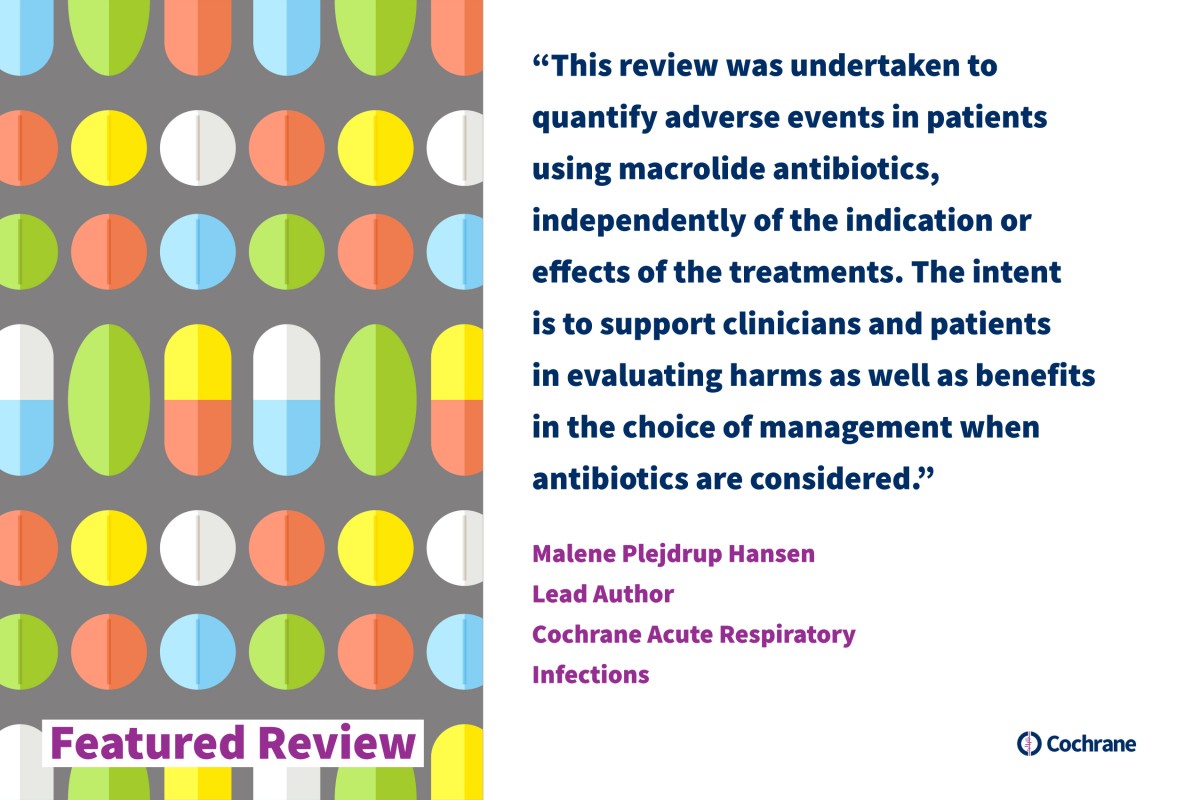
The review 'Adverse events in people taking macrolide antibiotics' asked, “Will people taking a macrolide antibiotic experience more adverse events than those treated with placebo?”
Macrolide antibiotics are one of many types of antibiotic. They are commonly used to treat both acute and chronic infections. The four most commonly used macrolides are azithromycin, clarithromycin, erythromycin, and roxithromycin. People taking macrolide antibiotics are at risk of experiencing adverse events such as nausea, diarrhoea or rashes.
Lead author of the review Malene Plejdrup Hansen explains, “This review was undertaken to quantify adverse events in patients using macrolide antibiotics, independently of the indication or effects of the treatments. The intent is to support clinicians and patients in evaluating harms as well as benefits in the choice of management when antibiotics are considered.”

The review includes 183 studies with 252,886 participants. Most studies were conducted in hospitals. Azithromycin and erythromycin were more commonly studied than clarithromycin and roxithromycin. Most studies (89%) reported some adverse events or at least stated that no adverse events were observed.
- People treated with a macrolide antibiotic experienced gastrointestinal adverse events, such as nausea, vomiting, abdominal pain, and diarrhoea more often than those treated with placebo.
- Taste disturbances were more often reported by people taking macrolides than those taking a placebo. However, very few studies reported on these adverse events, and results should be interpreted with caution.
- Hearing loss was more often reported by people taking macrolide antibiotics; however, only four studies reported this outcome.
- Macrolides caused less cough and less respiratory tract infections than placebo.
- We did not find any evidence that macrolides caused more cardiac disorders, liver disorders, blood infections, skin and soft tissue infections, changes in liver enzymes, appetite loss, dizziness, headache, respiratory symptoms, itching, or rashes than placebo.
- We did not find more deaths in people treated with macrolides than in those treated with placebo.
- Very limited information was available to assess if people taking a macrolide antibiotic were at greater risk of developing resistant bacteria than those treated with placebo. However, bacteria that did not respond to macrolide antibiotics were more commonly identified immediately after treatment in people taking a macrolide than in those treated with placebo, but differences in resistance thereafter were inconsistent.
The quality of evidence ranged from very low (cardiac disorders, change in liver enzymes, liver disorders), to low (abdominal pain, death, diarrhoea, dizziness, hearing loss, skin and soft tissue infections, taste disturbance, wheeze), to moderate (appetite loss, blood infection, cough, fever, headache, itching, nausea, rash, respiratory symptoms, respiratory tract infections, vomiting) according to GRADE assessment.
